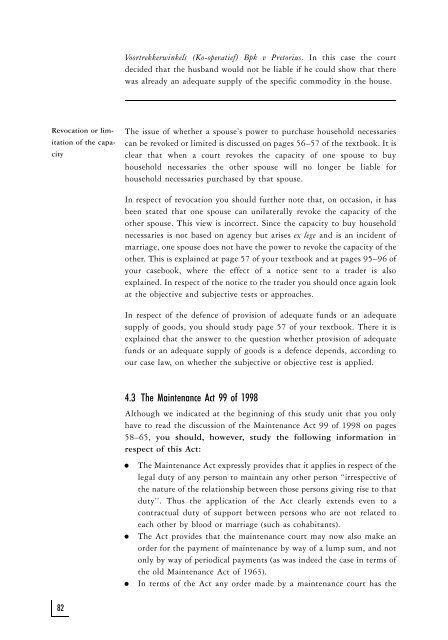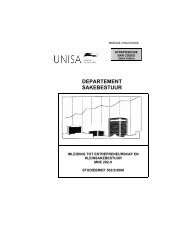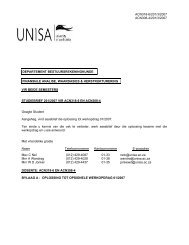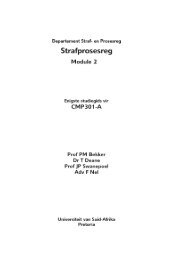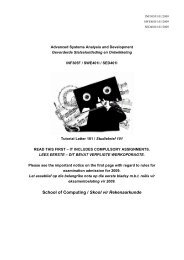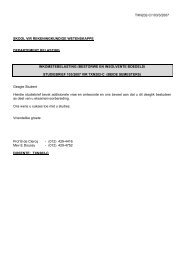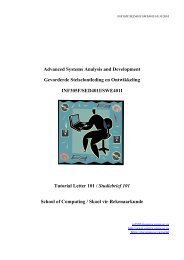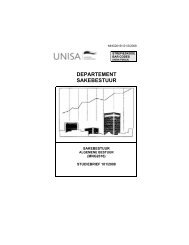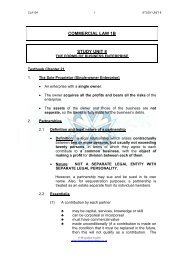key to the study guide - Name
key to the study guide - Name
key to the study guide - Name
You also want an ePaper? Increase the reach of your titles
YUMPU automatically turns print PDFs into web optimized ePapers that Google loves.
Revocation or limitation<br />
of <strong>the</strong> capacity<br />
82<br />
Voortrekkerwinkels (Ko-operatief) Bpk v Pre<strong>to</strong>rius. In this case <strong>the</strong> court<br />
decided that <strong>the</strong> husband would not be liable if he could show that <strong>the</strong>re<br />
was already an adequate supply of <strong>the</strong> specific commodity in <strong>the</strong> house.<br />
The issue of whe<strong>the</strong>r a spouse's power <strong>to</strong> purchase household necessaries<br />
can be revoked or limited is discussed on pages 56±57 of <strong>the</strong> textbook. It is<br />
clear that when a court revokes <strong>the</strong> capacity of one spouse <strong>to</strong> buy<br />
household necessaries <strong>the</strong> o<strong>the</strong>r spouse will no longer be liable for<br />
household necessaries purchased by that spouse.<br />
In respect of revocation you should fur<strong>the</strong>r note that, on occasion, it has<br />
been stated that one spouse can unilaterally revoke <strong>the</strong> capacity of <strong>the</strong><br />
o<strong>the</strong>r spouse. This view is incorrect. Since <strong>the</strong> capacity <strong>to</strong> buy household<br />
necessaries is not based on agency but arises ex lege andisaninciden<strong>to</strong>f<br />
marriage, one spouse does not have <strong>the</strong> power <strong>to</strong> revoke <strong>the</strong> capacity of <strong>the</strong><br />
o<strong>the</strong>r. This is explained at page 57 of your textbook and at pages 95±96 of<br />
your casebook, where <strong>the</strong> effect of a notice sent <strong>to</strong> a trader is also<br />
explained. In respect of <strong>the</strong> notice <strong>to</strong> <strong>the</strong> trader you should once again look<br />
at <strong>the</strong> objective and subjective tests or approaches.<br />
In respect of <strong>the</strong> defence of provision of adequate funds or an adequate<br />
supply of goods, you should <strong>study</strong> page 57 of your textbook. There it is<br />
explained that <strong>the</strong> answer <strong>to</strong> <strong>the</strong> question whe<strong>the</strong>r provision of adequate<br />
funds or an adequate supply of goods is a defence depends, according <strong>to</strong><br />
our case law, on whe<strong>the</strong>r <strong>the</strong> subjective or objective test is applied.<br />
4.3 The Maintenance Act 99 of 1998<br />
Although we indicated at <strong>the</strong> beginning of this <strong>study</strong> unit that you only<br />
have <strong>to</strong> read <strong>the</strong> discussion of <strong>the</strong> Maintenance Act 99 of 1998 on pages<br />
58±65, you should, however, <strong>study</strong> <strong>the</strong> following information in<br />
respec<strong>to</strong>fthisAct:<br />
. The Maintenance Act expressly provides that it applies in respect of <strong>the</strong><br />
legal duty of any person <strong>to</strong> maintain any o<strong>the</strong>r person ``irrespective of<br />
<strong>the</strong> nature of <strong>the</strong> relationship between those persons giving rise <strong>to</strong> that<br />
duty''. Thus <strong>the</strong> application of <strong>the</strong> Act clearly extends even <strong>to</strong> a<br />
contractual duty of support between persons who are not related <strong>to</strong><br />
each o<strong>the</strong>r by blood or marriage (such as cohabitants).<br />
. The Act provides that <strong>the</strong> maintenance court may now also make an<br />
order for <strong>the</strong> payment of maintenance by way of a lump sum, and not<br />
only by way of periodical payments (as was indeed <strong>the</strong> case in terms of<br />
<strong>the</strong> old Maintenance Act of 1963).<br />
. In terms of <strong>the</strong> Act any order made by a maintenance court has <strong>the</strong>


